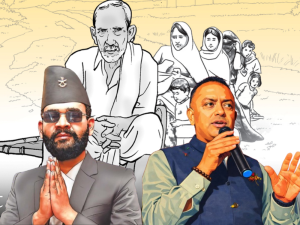Columns
Intellectual property versus consumer rights
Regulators must come between the act of cheating and the violation of consumer rights.
Roshee Lamichhane
Nepal is among those few countries where the number of legal disputes related to violation of trade-related intellectual property (IP) rights is disproportionately high compared to its industrialisation and registration of these rights, mainly in the form of trademarks, brands, patents and logos.
The countries with large and free markets have created extensive regulatory frameworks and implemented them. For example, the objective of the Indian Trademark Act 1999 is 'to protect trade interests and to prevent the deception of the consumers by the misuse or abuse of the trademark'. Consumers benefit from the information about the product provided through a distinctive word, phrase, logo, Internet domain name, graphic symbol, slogan or other device that is used to identify a source and to distinguish a manufacturer's product from that of others. Informed consumers are believed to make their purchasing decisions on the basis of recognisable marks or signs and become aware of the advantages of using a particular product. The United States has had a very powerful Antitrust Act in place since 1890. Nepal, too, with its own pitfalls and overdue amendments, has the Patent, Design and Trademark Act 1965.
Discouraged investors
The violation or infringement of these laws in the form of fraudulence, illegal copying and using 'look-alike' signs of popular products and brands inflict wounds in the economy like the swings of a double-edged sword. In an economy where patents and copyrights are not adequately protected, potential investors, domestic and foreign alike, are discouraged which, in turn, harms industrialisation and subsequently productivity. At the same time, consumers are cheated and unknowingly made to pay far higher prices for low-quality counterfeit products. Nepal suffers from both malaises.
The current mess is an outcome of a combination of imperviousness to timely updating of laws and regulations, lack of institutions and institutional efficiency, and a very conservative redressal mechanism. Pervasive impunity to wrongdoers and businesses without integrity has only encouraged the perpetuation of deceptive practices. Greedy and cunning businessmen are found to be trading shoddy merchandise and cheap imitations of established brands as an easier option to entering the market with innovative products and creative branding strategies.
It is the unwary consumer who is always prone to falling prey to very alluring but counterfeit substandard products offered by wily businessmen. Common consumers are exploited due to lack of awareness about various brands, which leads to an inability to distinguish genuine from duplicate. Such violations of consumer rights mislead them into buying these counterfeit products. Consumers are not aware of how the consumption of such fraudulent goods and fake services are going to affect their own wellbeing while eventually impeding the nation’s economic growth.
There is research evidence to suggest that it is the highly educated ones in society who are more prone to distrusting any information which exposes fraudulent food brands. Their habit of reading the labels makes them self-authenticate the brands. Conscious and unethical consumption is also partly due to their natural inclination attributable to economic rationalisation and institutional dependency. While the economic rationale emerges from the fact that consumers want value for money, institutional dependency refers to the personal belief that the onus of regulating the market to run on ethical lines lies exclusively on the government and its inspectors. In effect, it is a case of customers shifting the blame to external agencies instead of owning up their consumption.
It is the regulators who must come between the act of cheating and the violation of consumer rights. But our state in this regard has failed to protect the consumers. Some of the provisions in the Patent Act are so archaic that they, in fact, encourage violations. For example, fines as small as Rs10,000 to Rs100,000 hardly act as a strong deterrent to businesses that earn millions from a single instance of violation of this law.
There are other pseudo-nationalist legal loopholes that need immediate rectification. Domestic companies are able to register their trademarks by taking advantage of the government’s first come, first served policy and commence operations under a globally recognised sign or brand much before these well-known brands come to Nepal and duly register them. The absence of effective control mechanisms and understanding is resulting in failure to regulate such nefarious activities. Institutional inefficiency in regulation is one reason for increasing instances of IP violations in Nepal, among other reasons.
The initiative taken by the Department of Industry to maintain digital records of all registered trademarks and their classification is a step in the right direction. But its very purpose is defeated when business users experience difficulty in retrieving the necessary information from the digital records. The system will become business-friendly only when they are able to access and retrieve the logos of registered brands with a click—through robust automated hardware and user-friendly software.
Stuck in the courts
Trust deficit and lack of clarity about the legal provisions have always frustrated both foreign and local companies in this regard. It is a fact that a few cases of such infringement are languishing in litigation and have remained undecided in the courts for over 15 years. Sadly, crucial and relevant information besides proper knowledge about such critical incidents never gets highlighted. Techniques such as encryption schemes and digital watermarks can be employed to counter the dangers of online duplication and modification of the genuine works of others.
The Consumer Protection Act 2018 states that consumers have the 'right to information' about the price, quantity, purity and quality of the goods and services besides the 'right to education' that is not adequately elaborated in the law. However, there is a public sentiment that authorities are negligent towards this issue. This is corroborated by the fact that several deceptive and imitative products abound in the marketplaces. The upcoming bill on IPR is a welcome but 'too little too late' initiative. The proposed piece of legislation can be improved by incorporating all relevant aspects before it becomes law.




 27.41°C Kathmandu
27.41°C Kathmandu.jpg)



.jpg&w=200&height=120)











